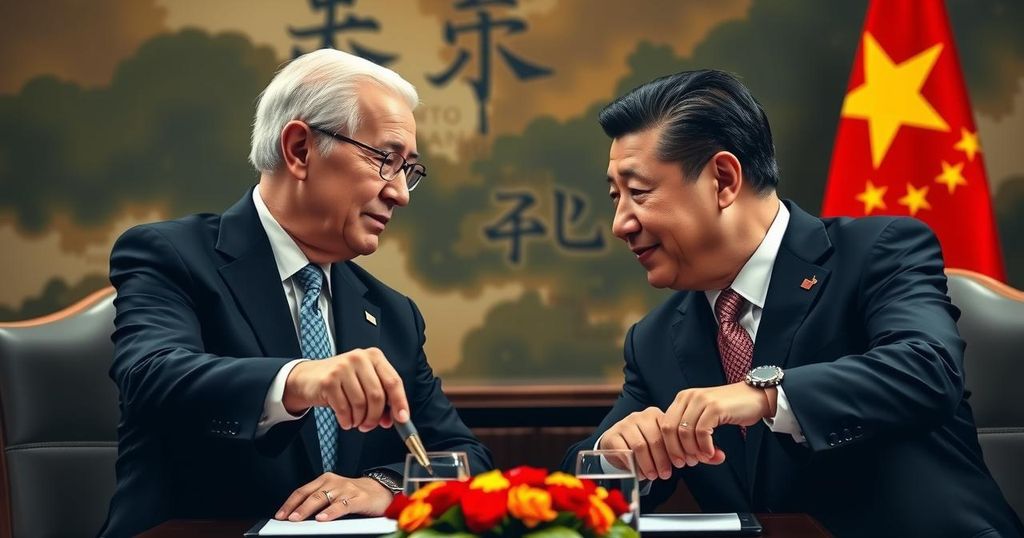Global news
ASIA - PACIFIC ECONOMIC COOPERATION, BIDEN, BIDEN ADMINISTRATION, DEFENSE, ENERGY INFRASTRUCTURE, EUROPE/ASIA, GEOPOLITICS, INTERNATIONAL RELATIONS, KURSK, MILITARY COOPERATION, NORTH, NORTH AMERICA, NORTH KOREA, PERU, RUSSIA, SOUTH AMERICA, UNITED STATES, XI, YOON, YOON SEOK YUL
Jamal Walker
0 Comments
Biden’s Final Meeting with Xi: Urging Action on North Korea and Regional Stability
President Biden is set to meet with China’s Xi Jinping in a crucial meeting focused on urging China to curb North Korean support for Russia in its invasion of Ukraine. This meeting, occurring at the Asia-Pacific Economic Cooperation conference, marks Biden’s last official interaction with Xi before leaving office. Concerns about escalating U.S.-China tensions and broader geopolitical dynamics will also be addressed.
In his final official meeting as President, Joe Biden is set to engage with Chinese leader Xi Jinping, specifically addressing concerns regarding North Korea’s increasing support for Russia in its conflict in Ukraine. This significant meeting will take place during the Asia-Pacific Economic Cooperation conference in Peru, just before Biden transitions to the upcoming Republican administration led by Donald Trump. Officials indicate that Biden will call on Xi to leverage China’s influence over North Korea to mitigate the escalating tensions posed by the regime’s actions, particularly its military cooperation with Russia. Additionally, Biden, alongside South Korean President Yoon Seok Yul and Japanese Prime Minister Shigeru Ishiba, has condemned North Korea’s military aid to Russia. They are unified in their belief that such contributions significantly destabilize the region. At the same time, the Biden administration has expressed growing frustration with Beijing for not taking a more proactive stance against Pyongyang, despite being North Korea’s primary trade partner. Biden’s discussions with Xi will cover a wide array of topics beyond just North Korea. Key issues include China’s role in the Ukraine conflict, human rights concerns, technological competition, and the contentious situation surrounding Taiwan. With a looming Trump administration, there are heightened uncertainties regarding U.S.-China relations, as Trump had previously suggested imposing severe tariffs on Chinese goods. Overall, as Biden prepares for his transition from the presidency, he is keenly aware of the critical importance of maintaining a working relationship with Xi, as well as with American business leaders who are concerned about the perception of China as a hostile environment for investments. This final meeting represents both an opportunity and a challenge for Biden as he positions his administration’s foreign policy priorities amidst evolving global dynamics. Moreover, the Biden administration has warned that the diplomatic challenges posed by China will likely be a significant foreign policy crisis for the incoming administration. There are increasing concerns over potential military confrontations in the South China Sea and surrounding Taiwan, which could escalate with misjudgments by either nation. Despite the positive rapport developed between Biden and Xi during their vice presidential years, the last four years have been fraught with escalating tensions, illustrated by incidents such as the downing of a Chinese surveillance balloon and ongoing cyber espionage concerns. As President Biden draws the curtains on his political tenure, the outcomes of this meeting will undoubtedly shape future interactions between China and the United States.
The context of this important meeting features ongoing geopolitical tensions, particularly surrounding North Korea’s military actions and their support for Russia amid its conflict with Ukraine. President Biden’s administration has been adamant that China bears significant responsibility for influencing North Korea due to its economic ties. Looking ahead, the transition to a new U.S. president raises additional concerns regarding how U.S.-China relations will evolve, particularly under Trump’s proposed policies. Furthermore, regional concerns over Taiwan and military activities in the South China Sea amplify the urgency of the discussions between Biden and Xi.
In summary, President Biden’s final engagement with Xi Jinping is underscored by pressing concerns over North Korean support for Russia and its implications for regional stability. As Biden seeks to influence Xi’s approach to Pyongyang, the broader context of U.S.-China relations continues to evolve, particularly with a transition to a new administration on the horizon. This meeting is pivotal, not only for immediate strategic interests but also for long-term diplomatic relations between these two global powers.
Original Source: www.hindustantimes.com




Post Comment